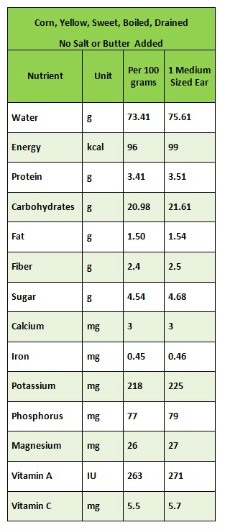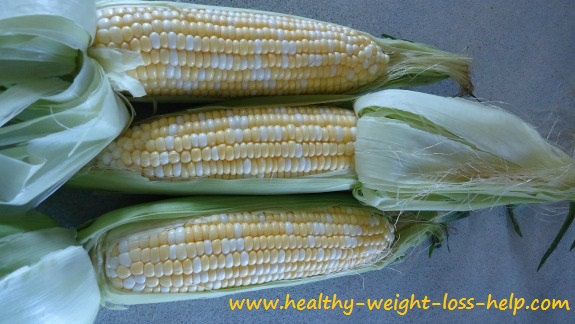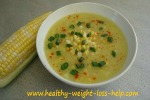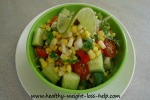Corn Nutrition
Is This Vegetable Dietary?
Corn nutrition offers more than just a delicious taste of summer. Along with those crunchy sweet kernels that burst between your teeth, it also provides us with certain health benefits.
Whether you boil them, roast them or grill them on the barbeque, corn has to be one of the most popular summer time treats when it comes to vegetables.
Of course to keep this vegetable as a healthy food we must watch how much butter and salt we slather on those cute little ears of corn.
So what benefits does corn nutrition offer us?

One benefit of corn is that it provides us with fiber. Fiber is essential to maintain healthy digestion and helps prevent issues such as constipation.
It also helps the body get rid of unwanted toxins (the fiber attaches and helps carry the toxins out of our bodies).
Studies show that soluble fiber is also helpful in lowering cholesterol levels, lowering the risk of heart disease and helps prevent the rapid rise of blood sugar levels making it an excellent choice for people suffering with diabetes or hypoglycemia.
Corn also provides much needed carbohydrates, calcium, iron, magnesium, phosphorus, potassium, vitamins A and C and much more.
Just as with many other fruits and vegetables, corn is rich in antioxidants too. They contain carotenoids, Vitamin C and Vitamin E which all help detox the body.
We need antioxidants as they help cleanse the body and help with disease prevention.
When you think of healthy eyes, think corn.
It's not only carrots that are good for the eyes, so is corn.
I love the word lutein and corn nutrition has a lot of it. It's because those carotenoids contain lutein and zeaxanthin which help protect the cells in our eyes.
In fact, according to The American Optometric Association , lutein and zeaxanthin may help prevent certain eye diseases, such as cataracts.
Corn Nutrition is also a good source of potassium which is an important mineral that we need to survive.
Why is potassium, so important for the human body? Well, it helps with the following body functions:
• Regulates blood pressure
• Blood sugar maintenance
• Muscle function (helps prevent muscle cramping)
• Nervous system
• Heart function
• Kidney function
• Adrenal functions
• Bone mass and strength (helps prevent osteoporosis)
• Needed for proper muscle growth
Some signs of potassium deficiency may include dry skin, acne, constipation and depression, fluctuations in heartbeat, muscular fatigue, weakness, headaches, chills, cognitive impairment and unquenchable thirst.
Some people think corn has too much sugar?
Would you ever stop yourself from eating an apple because it contains too much sugar. We all know that apples are a healthy snack and have been for years. Remember an apple a day keeps the Doctor away, right?
Well, a 100 grams of an apple contain 10.39 grams of sugar, whereas a 100 grams of corn contain only 4.54 grams.
So apples actually contain more than double the amount of sugar than corn does. So if you're a fan of the corn don't hesitate to sink your teeth in and enjoy an ear of corn once in a while.
Is this vegetable dietary?
It can be. The secret is not to slather the corn in butter and salt.
Another great way to enjoy corn nutrition is in a salad or soup. Since corn contains only 96 calories per 100 grams many meals containing corn can be a healthy choice.
Check out our corn salad recipe or our diet corn soup recipe that has only 259 calories per serving making it an excellent choice when dieting.
Carbohydrates is not a bad word.
Corn contains 20.98 grams of carbs per 100 grams and this should not scare you off. We need carbohydrates.
Why are carbohydrates so important and why we should eat them.
Without getting too scientific, quite simply put, carbohydrates are the main energy source for our bodies and our brains and we need them to function properly.
They not only provide energy but also provide nutrients and help protect our muscles because carbohydrates are the first source of energy are bodies use and when there are no carbohydrates then the protein from our muscles will be used up.
So clearly, the carbohydrates that corn nutrition offers, is a very important part of a healthy diet.
What is GMO corn?
The acronym GMO stands for genetically modified and GMO crops are getting more popular. This is when some corn crops have been genetically engineered to resist pests and herbicides.
Not all crops are genetically modified, but you can avoid GMO corn by buying organic and from certain farmers that you know grow it naturally.
Fun Tips and Info:
Not only is corn healthy, but it is extremely budget friendly when in season. This is a great time to make other meals with corn such as corn soup and corn salad.
Popcorn is also a great snack when dieting if it's not covered in hot butter and salt, and once corn is made into popcorn it is technically not a vegetable anymore, but considered a grain.
Return from Corn Nutrition to Healthy Food List
Return to Healthy Weight Loss Help



New! Comments
Have your say about what you just read. Leave us a comment in the box below.